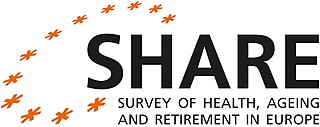Related Research Articles

The Survey of Income and Program Participation (SIPP) is a statistical survey conducted by the United States Census Bureau.
The National Center for Education Statistics (NCES) is the part of the United States Department of Education's Institute of Education Sciences (IES) that collects, analyzes, and publishes statistics on education and public school district finance information in the United States. It also conducts international comparisons of education statistics and provides leadership in developing and promoting the use of standardized terminology and definitions for the collection of those statistics. NCES is a principal agency of the U.S. Federal Statistical System.
NORC at the University of Chicago is one of the largest independent social research organizations in the United States. Established in 1941 as the National Opinion Research Center, its corporate headquarters is located in downtown Chicago, with offices in several other locations throughout the United States. Organized as an independent corporation, more than half its board comes from faculty and administration of the University of Chicago, it also jointly staffs some university academic research centers.

The Survey of Health, Ageing and Retirement in Europe (SHARE) is a multidisciplinary and cross-national panel database of micro data on health, socio-economic status and social and family networks. In seven survey waves to date, SHARE has conducted approximately 380,000 interviews with about 140,000 individuals aged 50 and over. The survey covers 27 European countries and Israel.
The English Longitudinal Study of Ageing (ELSA) is a longitudinal study that collects multidisciplinary data from a representative sample of the English population aged 50 and older. The study started in 2002 and there are currently 7 waves of completed data and an eighth wave is currently being collected. The survey data are designed to be used for the investigation of a broad set of topics relevant to understanding the ageing process. Both objective and subjective data are collected covering themes such as health trajectories, disability and healthy life expectancy, the determinants of economic position in older age; the links between economic position, physical health, cognition and mental health; the nature and timing of retirement and post-retirement, labour market activity; household and family structure, social networks and social supports; patterns, determinants and consequences of social, civic and cultural participation and predictors of well-being. ELSA is led by Professor Andrew Steptoe and is jointly run by teams at University College London (UCL), the Institute for Fiscal Studies (IFS), National Centre for Social Research and the University of Manchester.
Understanding Society, the UK Household Longitudinal Study (UKHLS), is one of the largest panel survey in the world, supporting social and economic research. Its sample size is 40,000 households from the United Kingdom or approximately 100,000 individuals.
The Centre for the Economics of Education (CEE) was a think tank in London, England, established in March 2000, with an extensive range of publications and reports on the economics of education. It ceased to operate in 2010.

China Family Panel Studies is a nationally representative, biennial longitudinal general social survey project designed to document changes in Chinese society, economy, population, education, and health. The CFPS was launched in 2010 by the Institute of Social Science Survey (ISSS) of Peking University, China. The data were collected at the individual, family, and community levels and are targeted for use in academic research and public policy analysis. CFPS focuses on the economic and non-economic well-being of the Chinese people, and covers topics such as economic activities, educational attainment, family relationships and dynamics, migration, and physical and mental health. The themes cover social, economic, education, health and so forth.
The Panel Study of Income Dynamics (PSID) is a longitudinal panel survey of American families, conducted by the Survey Research Center at the University of Michigan.
The Economic and Social Data Service (ESDS) is a national data archiving and dissemination service that was founded in January 2003. It is funded jointly by the Economic and Social Research Council (ESRC) and Jisc. In July 2012, the ESRC announced it will become a partner in the UK Data Service, to be established as of October 1, 2012.
ESDS Longitudinal is a specialist service of the Economic and Social Data Service (ESDS), led by the UK Data Archive at the University of Essex and the ESRC United Kingdom Longitudinal Studies Centre (ULSC), jointly funded by the Joint Information Systems Committee (JISC) and the Economic and Social Research Council (ESRC).
The General Household Survey (GHS) was a survey conducted of private households in Great Britain by the Office for National Statistics (ONS). The aim of this survey was to provide government departments and organisations with information on a range of topics concerning private households for monitoring and policy purposes.
The Omnibus Survey, now called the Opinions Survey, is a survey conducted monthly by the Office for National Statistics (ONS) in Great Britain in order to collect information for different governmental departments as well as non-profit organisations in the academic and voluntary sector.
The Health Survey for England (HSE) is a statistical survey which is conducted annually in order to collect information concerning health and health-related behaviour of people living in private households in England.
The Millennium Cohort Study (MCS) is a longitudinal survey conducted by the Centre for Longitudinal Studies (CLS) at the University of London, following the lives of a sample of about 18,818 babies born in the UK in the year 2000–2001.
The 1970 British Cohort Study (BCS70) is a continuing, multi-disciplinary longitudinal survey monitoring the development of babies born in the UK during the week of 5–11 April 1970.
The Families and Children Study (FACS) is a longitudinal study collecting information about families with dependent children in Great Britain, managed by the Department for Work and Pensions (DWP).

The Department for Education (DfE) is a department of Her Majesty's Government responsible for child protection, education, apprenticeships and wider skills in England.
The Fragile Families and Child Wellbeing Study (FFCWS) is a longitudinal birth cohort study of American children in urban areas, run by Princeton University and Columbia University with the University of Michigan. It uses a stratified random sample technique and an oversample of non-marital births. Baseline data collection ran from 1998–2000, with interviews with both biological parents shortly after the child's birth. Follow-up interviews were conducted when the child was one, three, five, and nine years old. Fifteen year interviews began in February 2014.
The Household, Income and Labour Dynamics in Australia (HILDA) survey is an Australian household-based panel study which began in 2001. It has been used for examining issues such as the incidence of persistent poverty; assets and income in the transition to retirement; the correlates and impact of changes in physical and mental health; and an international comparison of wealth and happiness. The survey is widely used by Australian and international researchers in the fields of economics, social science and social policy and by the Australian Government. The HILDA survey is managed by a small team from the Melbourne Institute of Applied Economic and Social Research at the University of Melbourne and the national fieldwork is carried out by ACNielsen and Roy Morgan Research. The survey is funded by the Australian Government through the Department of Social Services.
References
- ↑ Economic and Social Data Service (ESDS), LSYPE catalogue record entry, retrieved 22 September 2009
- ↑ ESDS Longitudinal, LSYPE webpages Archived 27 January 2010 at the Wayback Machine , retrieved 22 September 2009
- ↑ NatCen LSYPE Userguide to the dataset, waves 1-4, retrieved 22 September 2009